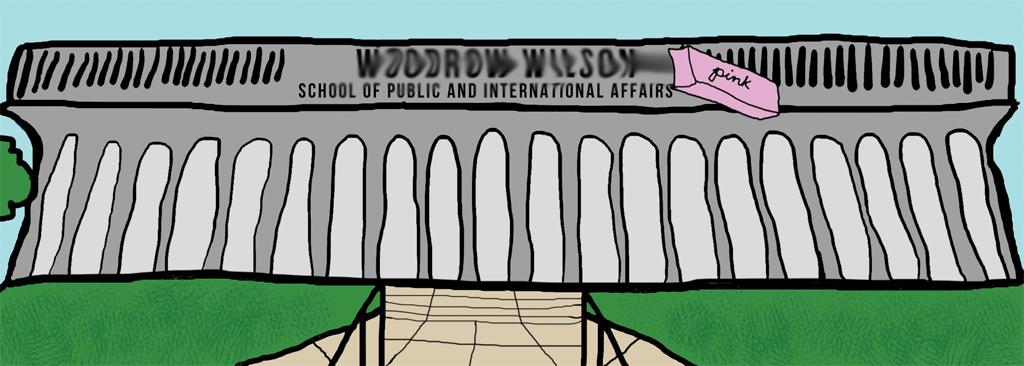

Nikki Moriello | Visual Editor
It seems like half of the city shares a name with the steel magnate Andrew Carnegie — but one day, Carnegie’s beliefs may force Pittsburgh to re-evaluate that association.
Princeton University is currently reconsidering attaching Woodrow Wilson, a former president of the university, to the Woodrow Wilson School of Public and International Affairs. On Nov. 18, members of the school’s Black Justice League began a sit-in in the university president’s office calling for the removal of Wilson’s name and image from the campus. The demonstration lasted for 32 hours, attracting national attention.
While Wilson’s service as the 28th president of the United States and former Princeton University president is admirable, moral blemishes litter his record.
Wilson resegregated federal agencies years after the government had integrated them and strongly rebuked black voting rights. He contributed pieces of writing to the pro-Ku Klux Klan film, “The Birth of a Nation.” Perhaps most relevant is that, while president of Princeton University, Wilson openly tried to dissuade black students from applying to his school, advising interested applicants to enroll in southern universities or other Ivy League schools.
The names of institutions matter because they live on as a constant presence on the campus, neighborhood or cultural center they inhabit. We have to consider the lingering harm of someone’s beliefs — not focus solely on their positive contributions. Revisiting and updating institutions to reflect modern values rather than clinging to symbolic names is a necessary part of social progress.
As our standards for judging people’s actions changes with time, owners and school administrators need to decide when possibly fostering a harmful dialogue outweighs an individual’s successes.
Legacies encompass all elements of a person. When you make someone a fixture of whatever you are building, you are signaling acceptance of them and what they have done. Unfortunately, connecting a person’s past to an institution can be a matter of economic necessity.
The dedication to Wilson was honorary, but that is not the only way a name ends up on top of a doorway. Institutions also name many buildings and programs after the people who give them enough money to exist.
Wealthy benefactors invest in a university or cultural center and, in return, are made the namesake of what they provide. The school or organization gets money for a cost-free symbol of appreciation. This has created a bizarre economy of trading cash for recognition. The exchange is, in itself, pretty harmless, but we enter a moral gray area.
Pittsburgh is a shining example of this economic exchange, with its relationship to Carnegie.
The problem is that the standards for how we name buildings under both honorary and financial circumstance are unstable.
Princeton named the graduate school after Wilson in 1948 to honor his work as president of both the university and the United States. The same year, President Harry Truman desegregated the military. Despite the country beginning to move away from his views, it still placed Wilson, the segregationist, on a pedestal. In all likelihood, people simply failed to address his racial record.
I would wager that most universities would not let Donald Trump have a building named after him in light of his racist remarks. But what about a businessman who sells products made in sweatshops? Would these cash-strapped schools turn away money from someone who committed injustices relatively out of the public eye? What if it meant the difference between increasing adjunct wages and offering more scholarships to low-income students?
Carnegie built 2,509 libraries around the world and founded 12 philanthropic trusts. But he also gave his steelworkers only one holiday off per year and had them work 12-hour days, seven days a week. He did a lot of good with money he made from doing not-so-good things. Should we embody him?
Of course, our moral standards change with time.
Owning a slave used to be uncontroversial. Now we view it as barbaric. What we see as acceptable today may seem horrific to people a century from now. Some people look down on eating meat as immoral, but they are a minority. Down the line, however, we might demand that institutions scrub carnivores from every building associated with them.
It is impossible to fully predict what our descendants will support. All we can do is work within our own understanding of the world and decide what represents our values. Wilson’s views were once acceptable, but hopefully we can all agree that they no longer are.
To dispel the protest, Princeton’s president has reached an agreement with the students to have Wilson’s legacy evaluated. The university will begin looking into whether removal of his name would be appropriate.
Measures like this should not be the result of outcry — they should be the norm. Evaluating how comfortable we are with our icons is the only way for us to move past the regrettable ones. Regardless of the outcome, Princeton’s evaluation sets an example.
Removing Wilson’s or anybody else’s name from a building does not mean that the person was insignificant. It just shows that our society has replaced the moral fibers tying these figures and institutions together over time, which is natural. In order to make sure the representations of our values stay current, we need to revisit foundational ones deeply and often.
Namesakes harm people who have to visit those buildings every day. The least we could do is regularly check their integrity — both structural and moral.
Matt Moret primarily writes on politics and rhetoric for The Pitt News.
Write to Matt at mdm123@pitt.edu.
Recent Posts
A Good Hill to Die On // The motivation we all need
In this post of “A Good Hill to Die On,” staff writer Sierra O’Neil discusses…
Who Asked? // Is it really the damn phones?
This installment of Who Asked? by staff writer Brynn Murawski describes her brief journey limiting…
Students are ‘upset, but not surprised’ over denial of gender affirming care at UPMC CHP
Pitt students and LGBTQIA+ members express their concerns about the recent denial of gender affirming…
Take Madness Final Four | Battle of Pennsylvania, 412 and Just Outside of Philly clash
Welcome to the Final Four of Take Madness! We are down to four talented writers,…
Column | Best Sports Environments in Pittsburgh
Pittsburgh is undoubtedly one of the best sports cities in America. A deeply passionate fanbase…
Chalk is all the talk: Previewing the NCAA men’s Final Four
For the first time since 2008, all four first seeds have made the men’s Final…


